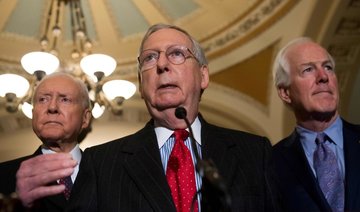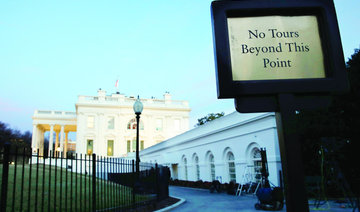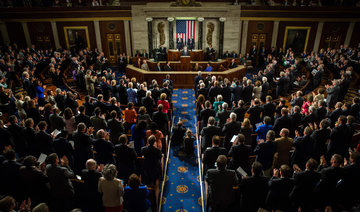WASHINGTON: US senators struck a deal on Monday to lift a three-day government shutdown and try to end a fight between Democrats and President Donald Trump's Republicans over immigration and border security.
Legislation to renew federal funding to the government cleared a procedural hurdle in the Senate and was expected soon to pass votes in the Senate and House of Representatives, allowing government to re-open through Feb 8.
Tens of thousands of federal workers had begun closing down operations for lack of funding on Monday, the first weekday since the shutdown, but essential services such as security and defense operations had continued.
Senate Democratic leader Chuck Schumer said he had come to an arrangement with Senate Majority Leader Mitch McConnell to keep the government open for the next few weeks after the Republican promised to let a bill on immigration reach the Senate floor.
The US government cannot fully operate without funding bills that are voted in Congress regularly. Washington has been hampered by frequent threats of a shutdown in recent years as the two parties fight over spending, immigration and other issues. The last US government shutdown was in 2013.
This shutdown, which began on the Friday's first anniversary of Trump’s inauguration as president, undercut his self-crafted image as a dealmaker who would repair the broken culture in Washington.
It had forced Trump to cancel a planned weekend trip to his Mar-a-Lago estate in Florida and created uncertainty around his scheduled trip this week to the World Economic Forum in Davos, Switzerland. However, the White House admitted he will fly to Davos as scheduled.
In negotiations over the shutdown, Democrats had insisted that legislation to keep the government running include protections for young undocumented immigrants known as "Dreamers."
Republicans in turn said they would not negotiate on immigration until Democrats gave them the votes needed to reopen the government.
TRUMP EXPECTED TO SIGN
Trump was expected to sign the legislation, which would give Congress more time to try to reach agreement on a long-term spending bill that would resolve issues including immigration, border security and spending caps.
McConnell promised to allow a fair and open immigration debate "to consider a proposal that can actually be signed into law, a bipartisan, bicameral group is already negotiating and I look forward to completion of its work.”
Such a debate would occur if a deal on an immigration bill is not reached before Feb. 8, McConnell said
Democrats want Congress to address the issue of the Dreamers, more than 700,000 immigrants brought to the United States illegally as children.
Democratic Senator Heidi Heitkamp welcomed the deal.
"You now have a commitment for a path forward for the so-called 'Dreamers.; That’s critical. We’re going to get a vote. We’re going to regular order," she said.
House of Representatives Republicans have been told by their leaders to plan on voting on re-opening the government immediately.
Markets have absorbed the shutdown drama over the last week, and on Monday morning world stocks and U.S. bond markets largely shrugged off the standoff even as the dollar continued its pullback. U.S. stocks were higher, the dollar was slightly lower and benchmark treasuries yields were off highs of the day.
Both sides in Washington had tried to blame each other for the shutdown.
Democrats said Trump had not only failed to bring both sides together but made a deal more difficult by changing his position on what kind of agreement on immigration he would accept.
Trump and Republicans accused Democrats of putting the interests of illegal immigrants ahead of US military personnel and government workers.
Early polls showed that Trump and Republican leaders were drawing most of the blame from American voters, but some Democrats worried they would pay a higher political cost if the shutdown dragged on.
US senators strike deal to end government shutdown
US senators strike deal to end government shutdown

Fire rips through slum area in Philippine capital

- Manila Fire District said around 1,000 houses were destroyed in the blaze
- The structures housed around 2,000 families, according to the fire department
Manila Fire District said around 1,000 houses were burned in the blaze that is thought to have started on the second floor of one of the homes.
There were no immediate reports of casualties.
Drone footage shared online by the city’s disaster agency showed houses in Isla Puting Bato village of Manila razed to the ground.
The structures housed around 2,000 families, according to the fire department.
Village resident Leonila Abiertas, 65, lost almost all her possessions, but managed to save her late husband’s ashes.
“I only got the urn with the ashes of my husband,” a crying Abiertas said.
“I really don’t know how I can start my life again after this fire.”
Fire and disaster services deployed 36 trucks and four fire boats while the country’s airforce sent in two helicopters to help extinguish the fire.
“That area is fire-prone since most of the houses there are made of light materials,” firefighter Geanelli Nunez said.
Turkiye’s Erdogan to discuss Ukraine war with NATO chief

ANKARA: Turkish President Tayyip Erdogan will discuss the latest developments in the Russia-Ukraine war with NATO Secretary General Mark Rutte on Monday during his visit to Ankara, a Turkish official said on Sunday.
Russia struck Ukraine with a new hypersonic medium-range ballistic missile on Thursday in response to Kyiv’s use of US and British missiles against Russia, marking an escalation in the war that began when Moscow launched a full-scale invasion of its neighbor in February 2022.
NATO member Turkiye, which has condemned the Russian invasion, says it supports Ukraine’s territorial integrity and it has provided Kyiv with military support.
But Turkiye, a Black Sea neighbor of both Russia and Ukraine, also opposes Western sanctions against Moscow, with which it shares important defense, energy and tourism ties.
On Wednesday, Erdogan opposed a US decision to allow Ukraine to use long-range missiles to attack inside Russia, saying it would further inflame the conflict, according to a readout shared by his office.
Moscow says that by giving the green light for Ukraine to fire Western missiles deep inside Russia, the US and its allies are entering into direct conflict with Russia. On Tuesday, Putin approved policy changes that lowered the threshold for Russia to use nuclear weapons in response to an attack with conventional weapons.
During their talks on Monday, Erdogan and Rutte will also discuss the removal of defense procurement obstacles between NATO allies and the military alliance’s joint fight against terrorism, the Turkish official said.
Blasts heard in Ukraine’s Kyiv, witnesses report

KYIV: Explosions were heard early on Sunday in Kyiv, Reuters’ witnesses and local media in the Ukrainian capital reported.
The blasts sounded like air defense units in operation, Reuters’ witnesses reported. There was no immediate official comment from Ukraine’s military. Kyiv and its surrounding region and most of northeast Ukraine were under air raid alerts, starting at around 0100 GMT.
Meanwhile, Russia’s air defense systems destroyed 34 Ukrainian drones overnight, including 27 over the Kursk region bordering Ukraine, Russia’s defense ministry said in a post on its Telegram messaging app on Sunday.
The ministry, in its post, did not mention an earlier statement by the Kursk governor that air defense units had destroyed two “Ukrainian missiles” overnight over the region.
Developing nations slam ‘paltry’ $300 billion climate deal

- Developing countries say finance pact “optical illusion” and “lack of goodwill” from rich countries amid heated negotiations
- Agreement commits developed nations to pay at least $300 billion a year by 2035 to help developing countries green their economies
BAKU: The world approved a bitterly negotiated climate deal Sunday but poorer nations most at the mercy of worsening disasters dismissed a $300 billion a year pledge from wealthy historic polluters as insultingly low.
After two exhausting weeks of chaotic bargaining and sleepless nights, nearly 200 nations banged through the contentious finance pact in the early hours in a sports stadium in Azerbaijan.
But the applause had barely subsided when India delivered a full-throated rejection of the “abysmally poor” deal, kicking off a firestorm of criticism from across the developing world.
“It’s a paltry sum,” thundered India’s delegate Chandni Raina.
“This document is little more than an optical illusion. This, in our opinion, will not address the enormity of the challenge we all face.”
Sierra Leone’s climate minister Jiwoh Abdulai said it showed a “lack of goodwill” from rich countries to stand by the world’s poorest as they confront rising seas and harsher droughts.
Nigeria’s envoy Nkiruka Maduekwe put it more bluntly: “This is an insult.”
Some countries had accused Azerbaijan, an oil and gas exporter, of lacking the will to meet the moment in a year defined by costly disasters and on track to become the hottest on record.
But at protests throughout COP29, developed nations — major economies like the European Union, United States and Japan — were accused of negotiating in bad faith, making a fair deal impossible.
Developing nations arrived in the Caspian Sea city of Baku hoping to secure a massive financial boost from rich countries many times above their existing pledge of $100 billion a year.
Tina Stege, climate envoy for the Marshall Islands, said she would return home with only “small portion” of what she fought for, but not empty-handed.
“It isn’t nearly enough, but it’s a start,” said Stege, whose atoll nation homeland faces an existential threat from creeping sea levels.
Nations had struggled at COP29 to reconcile long-standing divisions over how much developed nations most accountable for historic climate change should provide to poorer countries least responsible but most impacted by Earth’s rapid warming.
UN climate chief Simon Stiell acknowledged the final deal was imperfect and said “no country got everything they wanted.”
“This is no time for victory laps,” he said.
UN Secretary-General Antonio Guterres said he had “hoped for a more ambitious outcome” and appealed to governments to see it as a starting point.
Developed countries only put the $300 billion figure on the table on Saturday after COP29 went into extra time and diplomats worked through the night to improve an earlier spurned offer.
Bleary-eyed diplomats, huddled anxiously in groups, were still polishing the final phrasing on the plenary floor in the dying hours before the deal passed.
UK Energy Secretary Ed Miliband hailed “a critical eleventh hour deal at the eleventh hour for the climate.”
At points, the talks appeared on the brink of collapse.
Delegates stormed out of meetings, fired shots across the bow, and threatened to walk away from the negotiating table should rich nations not cough up more cash.
In the end — despite repeating that “no deal is better than a bad deal” — developing nations did not stand in the way of an agreement.
US President Joe Biden cast the agreement reached in Baku as a “historic outcome.”
EU climate envoy Wopke Hoekstra said it would be remembered as “the start of a new era for climate finance.”
The agreement commits developed nations to pay at least $300 billion a year by 2035 to help developing countries green their economies, cut emissions and prepare for worse disasters.
It falls short of the $390 billion that economists commissioned by the United Nations had deemed a fair share contribution by developed nations.
“This COP has been a disaster for the developing world,” said Mohamed Adow, the Kenyan director of Power Shift Africa, a think tank.
“It’s a betrayal of both people and planet, by wealthy countries who claim to take climate change seriously.”
The United States and EU pushed to have newly wealthy emerging economies like China — the world’s largest emitter — chip in.
Wealthy nations said it was politically unrealistic to expect more in direct government funding at a time of geopolitical uncertainty and economic belt-tightening.
Donald Trump, a skeptic of both climate change and foreign assistance, was elected just days before COP29 began and his victory cast a pall over the UN talks.
Other countries, particularly in the EU — the largest contributor of climate finance — saw right-wing backlashes against the green agenda, not fertile conditions for raising big sums of public money.
The final deal “encourages” developing countries to make contributions on a voluntary basis, reflecting no change for China, which already provides climate finance on its own terms.
The deal also posits a larger overall target of $1.3 trillion per year to cope with rising temperatures and disasters, but most would come from private sources.
Mounting economic costs of India’s killer smog

- India’s capital New Delhi frequently ranks among the world’s most polluted cities
- One study estimate India’s economic losses due to worsening air pollution at $95 billion yearly
NEW DELHI: Noxious smog smothering the plains of north India is not only choking the lungs of residents and killing millions, but also slowing the country’s economic growth.
India’s capital New Delhi frequently ranks among the world’s most polluted cities. Each winter, vehicle and factory emissions couple with farm fires from surrounding states to blanket the city in a dystopian haze.
Acrid smog this month contains more than 50 times the World Health Organization recommended limit of fine particulate matter — dangerous cancer-causing microparticles known as PM2.5 pollutants, that enter the bloodstream through the lungs.
Experts say India’s worsening air pollution is having a ruinous impact on its economy — with one study estimating losses to the tune of $95 billion annually, or roughly three percent of the country’s GDP.
The true extent of the economic price India is paying could be even greater.
“The externality costs are huge and you can’t assign a value to it,” said Vibhuti Garg, of the Institute for Energy Economics and Financial Analysis.
Bhargav Krishna of the Delhi-based research collective Sustainable Futures Collaborative said “costs add up in every phase.”
“From missing a day at work to developing chronic illness, the health costs associated with that, to premature death and the impact that has on the family of the person,” Krishna told AFP.

Still, several studies have tried to quantify the damage.
One by the global consultancy firm Dalberg concluded that in 2019, air pollution cost Indian businesses $95 billion due to “reduced productivity, work absences and premature death.”
The amount is nearly three percent of India’s budget, and roughly twice its annual public health expenditure.
“India lost 3.8 billion working days in 2019, costing $44 billion to air pollution caused by deaths,” according to the study which calculated that toxic air “contributes to 18 percent of all deaths in India.”
Pollution has also had a debilitating impact on the consumer economy because of direct health-related eventualities, the study said, reducing footfall and causing annual losses of $22 billion.
The numbers are even more staggering for Delhi, the epicenter of the crisis, with the capital province losing as much as six percent of its GDP annually to air pollution.
Restaurateur Sandeep Anand Goyle called the smog a “health and wealth hazard.”
“People who are health conscious avoid stepping out so we suffer,” said Goyle, who heads the Delhi chapter of the National Restaurant Association of India.
Tourism has also been impacted, as the smog season coincides with the period when foreigners traditionally visit northern India — too hot for many during the blisteringly hot summers.
“The smog is giving a bad name to India’s image,” said Rajiv Mehra of the Indian Association of Tour Operators.
Delhi faces an average 275 days of unhealthy air a year, according to monitors.
Piecemeal initiatives by the government — that critics call half-hearted — have failed to adequately address the problem.
Academic research indicates that its detrimental impact on the Indian economy is adding up.
A 2023 World Bank paper said that air pollution’s “micro-level” impacts on the economy translate to “macro-level effects that can be observed in year-to-year changes in GDP.”
The paper estimates that India’s GDP would have been 4.5 percent higher at the end of 2023, had the country managed to curb pollution by half in the previous 25 years.
Another study published in the Lancet health journal on the direct health impacts of air pollution in 2019 estimated an annual GDP deceleration of 1.36 percent due to “lost output from premature deaths and morbidity.”
Desperate emergency curbs — such as shuttering schools to reduce traffic emissions as well as banning construction — come with their own economic costs.
“Stopping work for weeks on end every winter makes our schedules go awry, and we end up overshooting budgets,” said Sanjeev Bansal, the chairman of the Delhi unit of the Builders Association of India.
Pollution’s impact on the Indian economy is likely to get worse if action is not taken.
With India’s median age expected to rise to 32 by 2030, the Dalberg study predicts that “susceptibility to air pollution will increase, as will the impact on mortality.”


















